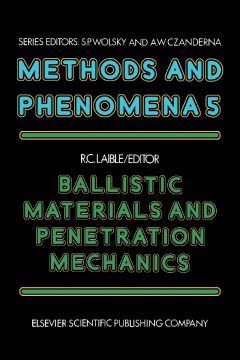
Additional Information
Book Details
Abstract
Ballistic Materials and Penetration Mechanics deals with ballistically protective materials and penetration mechanics. The book discusses historical and practical considerations of ballistic protection, including metallic armor, as well as ballistic testing methodology, the ability of a protective material to stop or slow down a particular projectile, and the theoretical aspects of penetration mechanics. It also highlights the importance of stress wave analysis in the penetration and spalling phenomena.
Organized into 12 chapters, this volume begins with an overview of the history of the armor and the modern helmet. It proceeds with a discussion of variations in ballistic test methods, errors in test methods, and the importance of the hardness and geometry of both the target and the projectile. The next chapters focus on the importance of fibrous armor, materials that are visually transparent and resistant to penetration by high-energy projectiles and fragments, and transparent armor and ceramic composite armor. The reader is also introduced to materials used in the design of metallic armor, the role of stress waves in the penetration problem, and the use of computer simulation to analyze ballistic impact experiments. The book looks at numerical techniques for modeling hypervelocity impact and concludes with a chapter on the penetration mechanics of textile structures.
This book is a valuable resource for scientists working at government, industrial, and university laboratories, as well as law enforcement officers and others who want information on materials that provide the best protection against damage from impacts, explosions, and bullets.
